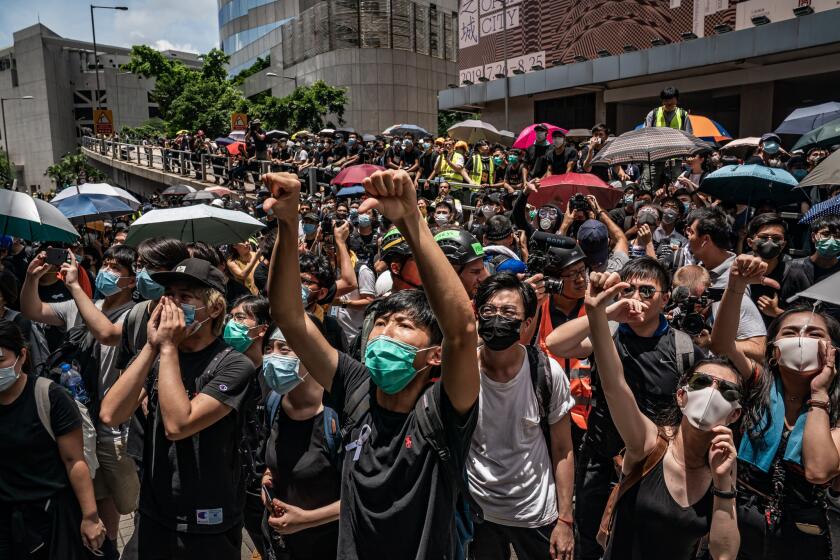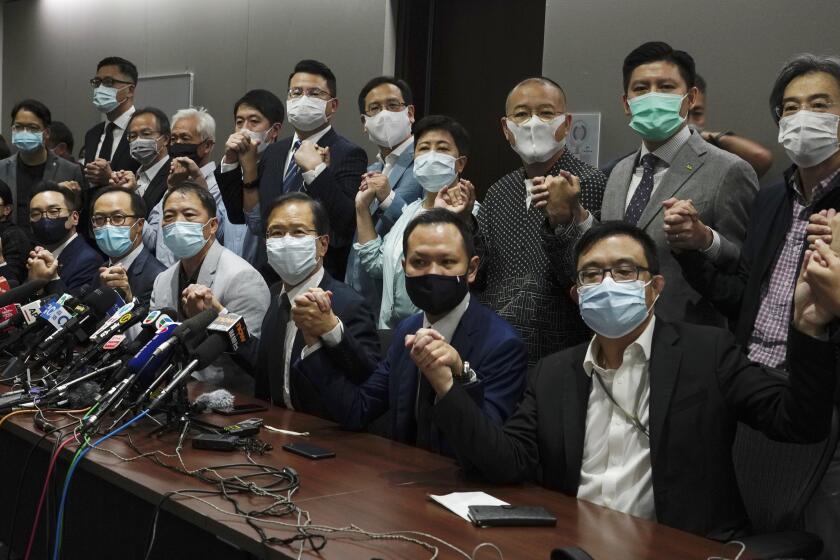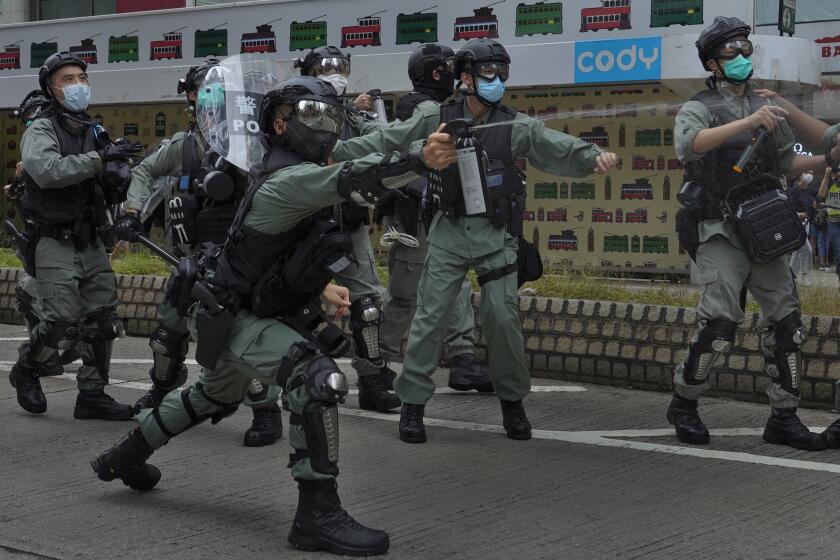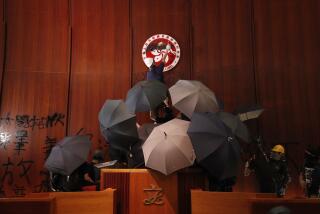U.S. lawyer released on bail in Hong Kong crackdown on democracy activists
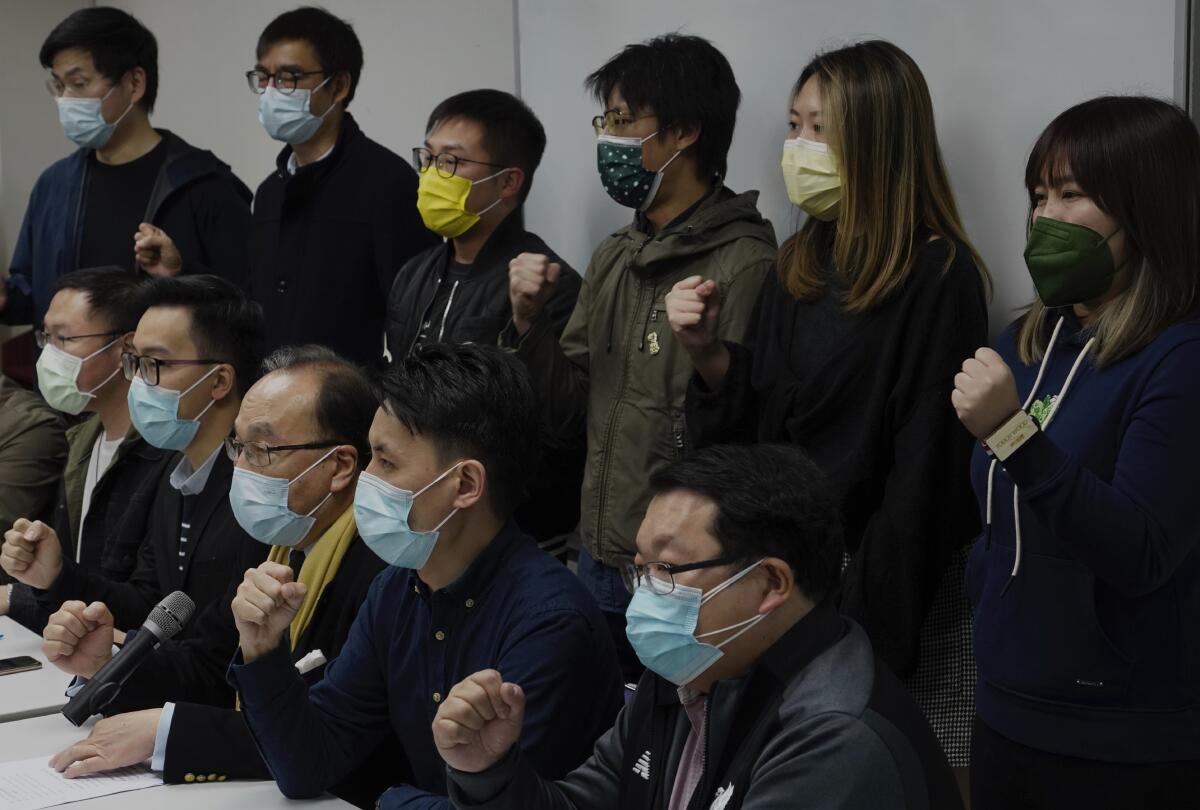
- Share via
HONG KONG — An American human rights lawyer who was one of 53 pro-democracy activists rounded up by authorities in Hong Kong has been released on bail even as authorities arrested another prominent opposition figure.
John Clancey, who works at the law firm Ho Tse Wai & Partners, was granted bail in connection with his arrest Wednesday under Hong Kong’s national security law, an associate said. Clancey did not immediately return a call seeking comment.
Prominent activist Joshua Wong, already serving a 13-and-a-half-month prison sentence for organizing and participating in an unauthorized protest in 2019, was arrested Thursday on a new allegation under the security law. Wong’s friends and family were informed that he had been arrested and taken from prison to give a statement on the new alleged violation, according to a post on his Facebook page.
The post also stated that Wong’s lawyer was unable to meet with him and that Wong had been transferred back to prison after giving a statement.
The activists are accused of taking part in an unofficial primary election last year that authorities say was part of a plan to paralyze the government and subvert state power.
The mass arrests were the most aggressive move against Hong Kong’s democracy movement since Beijing imposed the law last June to quell dissent in the semi-autonomous territory following months of anti-government protests in 2019.
China is targeting government opponents through financial institutions using a draconian national security law that’s already led to U.S. sanctions.
The primary was held by the pro-democracy camp to determine the best candidates to field to try to win a majority in Hong Kong’s legislature.
While most of those arrested were candidates in the primary, Clancey was a treasurer for political organization Power for Democracy, which was involved in the event.
The arrests drew condemnation from the U.N., the U.S. and Europe.
Secretary of State Michael R. Pompeo said he was “appalled by the news of the arrest of an American citizen as part of this campaign of political repression.” He said the United States would not tolerate the arbitrary detention or harassment of its citizens and would explore further sanctions and restrictions on Chinese and Hong Kong officials and entities.
The mass resignation came after Hong Kong’s pro-Beijing government ousted four pro-democracy lawmakers from the city’s Legislative Council.
The legislative election that would have followed the unofficial primary was postponed for a year by Hong Kong Chief Executive Carrie Lam, who cited public health risks during the COVID-19 pandemic.
The remaining activists will be granted bail without charge, although most had their passports confiscated as evidence, according to the Hong Kong-based South China Morning Post, citing unnamed sources.
The security law criminalizes acts of subversion, secession, terrorism and collusion with foreign powers to intervene in the city’s affairs. Serious offenders could face up to a maximum punishment of life imprisonment.
Authorities pointed to a plan called “10 steps to mutual destruction” allegedly indicating that the primaries were part of a broader push to cause damage to both Hong Kong and mainland China.
News Alerts
Get breaking news, investigations, analysis and more signature journalism from the Los Angeles Times in your inbox.
You may occasionally receive promotional content from the Los Angeles Times.
That plan was published as an opinion piece in the Apple Daily newspaper by former law professor and pro-democracy activist Benny Tai, who was also arrested Wednesday. He said that between 2020 and 2022, there would be 10 steps to “mutual destruction,” including the pro-democracy bloc winning a majority in the legislature, intensifying protests, the forced resignation of Lam due to the budget bill being rejected twice and international sanctions against the ruling Chinese Communist Party.
Liz Throssell, a spokesperson for the U.N. Human Rights Council in Geneva, said the arrests indicate that “the offense of subversion under the National Security Law is indeed being used to detain individuals for exercising legitimate rights to participate in political and public life.”
Kurt Tong, the former U.S. consul general in Hong Kong, saw the arrests as part of a methodical and escalating campaign to eradicate political opposition from both protesters and elected parties.
“The national security law provides the legal foundation to do that,” said Tong, now a partner at the Asia Group consultancy in Washington.
Beijing is using the coronavirus crisis to crush Hong Kong’s demands for more freedom, thinking the world is too busy to care.
China wants to preserve Hong Kong’s economic vibrancy and free market without what it views as political complications, he said. He didn’t predict a mass exodus by companies, saying the city retains its residual energy and dynamism, but warned there could be a measurable impact over time.
“China’s taking a big gamble by picking away at parts of the Hong Kong system that it doesn’t like,” he said. “It really risks damaging parts that it values.”
More to Read
Sign up for Essential California
The most important California stories and recommendations in your inbox every morning.
You may occasionally receive promotional content from the Los Angeles Times.
